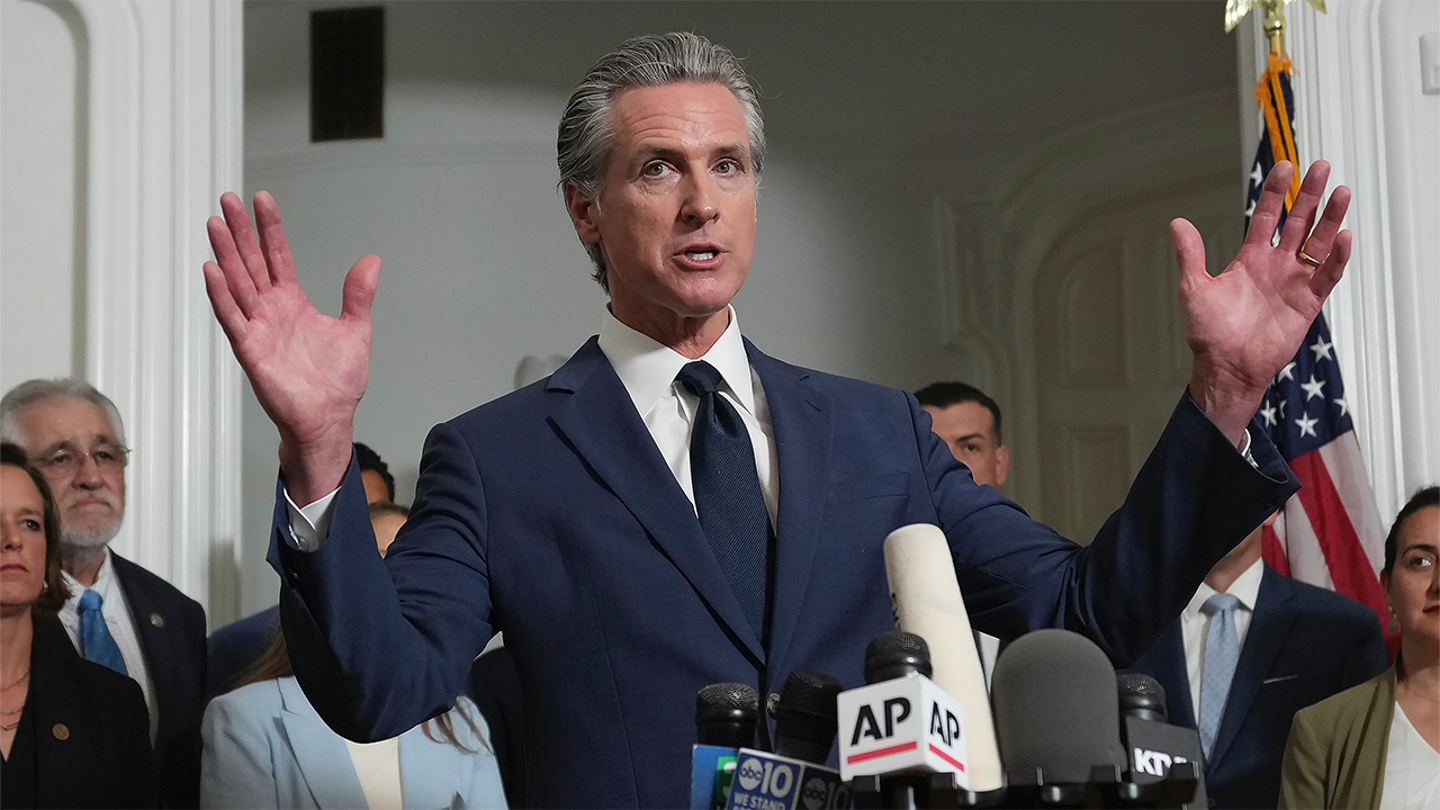
Gavin Newsom thanks you for your attention to redistricting
Entities mentioned:
- Gavin Newsom: Ambition, Power, Recognition
- Donald Trump: Power, Control, Self-preservation
- Arnold Schwarzenegger: Justice, Legacy, Influence
- Nancy Pelosi: Loyalty, Power, Influence
- Lorena Gonzalez: Justice, Moral outrage, Influence
- Alex Padilla: Loyalty, Unity, Recognition
- Maxine Waters: Loyalty, Justice, Recognition
Article Assessment:
Credibility Score: 70/100
Bias Rating: 35/100 (Lean Left)
Sentiment Score: 45/100
Authoritarianism Risk: 55/100 (Mixed/Neutral)
Bias Analysis:
The article leans left, focusing primarily on Democratic perspectives and Newsom's justifications. While it includes some criticism of Newsom, it generally frames his actions in a positive light and provides limited space for opposing viewpoints.
Key metric: Electoral Integrity
As a social scientist, I analyze that this article highlights a significant shift in California's approach to redistricting, led by Governor Gavin Newsom. This move represents a departure from the state's previous commitment to an independent redistricting commission, potentially impacting electoral integrity. The initiative, framed as a response to Republican actions in other states, particularly Texas, signals an escalation in partisan redistricting battles. This could have far-reaching consequences for national political representation and the balance of power in the U.S. House of Representatives. The article also underscores Newsom's potential presidential ambitions and his efforts to position himself as a strong opposition leader against the Trump administration. The redistricting fight is presented as a key battleground for Democratic resistance and a test of Newsom's leadership on the national stage. However, this approach risks further polarization and could potentially undermine public faith in democratic processes, depending on how it is perceived and implemented.

Newsom's office continues to mock Trump using his social media writing style: 'TINY HANDS'
Entities mentioned:
- Gavin Newsom: Competitive spirit, Ambition, Recognition
- Donald Trump: Power, Pride, Recognition
- Vladimir Putin: Power, Influence, Control
- California Democrats: Power, Control, Competitive spirit
- Texas Republicans: Power, Control, Competitive spirit
Article Assessment:
Credibility Score: 70/100
Bias Rating: 35/100 (Lean Left)
Sentiment Score: 30/100
Authoritarianism Risk: 45/100 (Mixed/Neutral)
Bias Analysis:
The article leans left, primarily presenting Newsom's perspective and actions without substantial counterbalance. While it reports factual events, the framing and extensive quoting of Newsom's mocking posts suggest a bias favoring Democratic viewpoints.
Key metric: Political Polarization
As a social scientist, I analyze that this article showcases the increasing political polarization in the United States. Governor Newsom's office is employing a provocative communication strategy that mimics and mocks former President Trump's distinctive social media style. This approach, while potentially effective in galvanizing Newsom's base, risks further deepening the divide between political factions. The use of exaggerated claims, personal attacks, and inflammatory language in official communications from a governor's office indicates a shift towards more confrontational and less diplomatic political discourse. This could potentially impact democratic norms and expectations of civil political engagement, contributing to a more divisive political climate.

Texas House Speaker vows runaway Dems will be arrested if they try to sneak home over weekend
Entities mentioned:
- Dustin Burrows: Control, Power, Determination
- Texas Democrats: Righteousness, Justice, Self-preservation
- Greg Abbott: Power, Control, Determination
- Gavin Newsom: Ambition, Competitive spirit, Power
- Donald Trump: Power, Control, Influence
- Gene Wu: Justice, Righteousness, Determination
- Ken Paxton: Power, Control, Loyalty
Article Assessment:
Credibility Score: 70/100
Bias Rating: 55/100 (Center)
Sentiment Score: 30/100
Authoritarianism Risk: 65/100 (Authoritarian Tendencies)
Bias Analysis:
The article presents both Republican and Democratic perspectives, but slightly more space is given to Republican actions and quotes. The framing of Democrats as 'runaway' and 'fleeing' suggests a subtle lean towards Republican narrative.
Key metric: Electoral Competitiveness
As a social scientist, I analyze that this article highlights the intense political maneuvering around congressional redistricting in Texas and California, which directly impacts electoral competitiveness. The actions of both Republican and Democratic parties demonstrate a concerted effort to gain political advantage through map-drawing, potentially reducing the number of competitive districts. This could lead to increased polarization and decreased representation of diverse viewpoints. The use of tactics such as fleeing the state to prevent quorum and threats of arrest indicate a heightened level of partisan conflict, which may erode democratic norms and public trust in the electoral process. The contrasting approaches in Texas and California also reflect the broader national debate on redistricting methods and their impact on fair representation.

Obama praises Texas Democrats and calls state redistricting effort ‘a systematic assault on democracy’
Entities mentioned:
- Barack Obama: Justice, Democracy, Influence
- Texas House Democrats: Righteousness, Justice, Determination
- Republican Party: Power, Control, Self-preservation
- California: Justice, Competitive spirit, Influence
- Gavin Newsom: Justice, Competitive spirit, Influence
- Eric Holder: Justice, Democracy, Influence
- Donald Trump: Power, Control, Self-preservation
Article Assessment:
Credibility Score: 75/100
Bias Rating: 35/100 (Lean Left)
Sentiment Score: 35/100
Authoritarianism Risk: 25/100 (Generally Democratic)
Bias Analysis:
The article leans left in its framing, giving more voice and positive portrayal to Democratic figures and their motivations. While it includes some Republican perspective, it predominantly presents the Democratic view of the redistricting issue.
Key metric: Electoral Integrity
As a social scientist, I analyze that this article highlights a significant debate over redistricting efforts in Texas, with implications for broader democratic processes in the United States. The involvement of former President Obama lends weight to the Democrats' stance against what they perceive as unfair gerrymandering by Republicans. The article frames the issue as a struggle for democratic integrity, with Republicans portrayed as attempting to manipulate the system for political gain. This conflict reflects deeper tensions in American politics regarding representation, electoral fairness, and the balance of power between parties. The mention of other states like California responding to these actions suggests a potential escalation of partisan map-drawing across the country, which could have long-term effects on electoral outcomes and political polarization. The article also touches on broader concerns about democratic erosion, linking redistricting to other issues such as voter suppression and executive overreach, indicating a complex interplay of factors affecting the key metric of Electoral Integrity.

Newsom announces California redistricting push, setting up a standoff with GOP-led opponents
Entities mentioned:
- Gavin Newsom: Power, Justice, Competitive spirit
- Donald Trump: Power, Control, Influence
- Greg Abbott: Power, Control, Competitive spirit
- Arnold Schwarzenegger: Justice, Legacy, Righteousness
- Charles Munger Jr.: Justice, Influence, Legacy
- League of Women Voters: Justice, Duty, Righteousness
- Common Cause: Justice, Influence, Duty
- Steve Hilton: Ambition, Competitive spirit, Justice
- Kevin Kiley: Justice, Duty, Self-preservation
Article Assessment:
Credibility Score: 75/100
Bias Rating: 45/100 (Center)
Sentiment Score: 35/100
Authoritarianism Risk: 55/100 (Mixed/Neutral)
Bias Analysis:
The article presents multiple viewpoints and includes voices from both sides of the debate. While it gives slightly more space to Newsom's perspective, it also presents counterarguments and opposition views, maintaining a relatively balanced approach.
Key metric: Electoral Integrity
As a social scientist, I analyze that this article highlights a significant political conflict over redistricting in California, with potential national implications. Governor Newsom's push to redraw congressional maps is framed as a response to Republican efforts in other states, particularly Texas. This creates a complex dynamic where democratic principles (independent redistricting) are being challenged in the name of perceived fairness and political competition. The involvement of various political actors, advocacy groups, and former officials demonstrates the high stakes of this issue. The potential impact on Electoral Integrity is substantial, as it could affect the balance of power in Congress and set precedents for how states respond to redistricting efforts in other parts of the country. The article also touches on broader themes of partisanship, the role of independent commissions, and the tension between state-level democracy and national political strategy.

Ex-GOP National spox rips commentary rooting against Ukraine-Russia peace deal: 'Absolute shame'
Entities mentioned:
- GOP National spokesperson: Moral outrage, Duty, Self-respect
- I.C.E.: Duty, Security, Control
- Gavin Newsom: Ambition, Power, Influence
- Donald Trump: Power, Recognition, Influence
- Vladimir Putin: Power, Control, Influence
- Zohran Mamdani: Ambition, Moral outrage, Recognition
Article Assessment:
Credibility Score: 55/100
Bias Rating: 55/100 (Center)
Sentiment Score: 35/100
Authoritarianism Risk: 45/100 (Mixed/Neutral)
Bias Analysis:
The article presents a mix of perspectives, including criticism of both left and right-leaning figures. However, the framing of issues and choice of topics suggests a slight centrist tilt, balancing different political viewpoints.
Key metric: Political Polarization Index
As a social scientist, I analyze that this article touches on multiple contentious political issues, including immigration enforcement, international diplomacy, urban crime, and political criticism. The mention of an I.C.E. raid at a Gavin Newsom event suggests ongoing tension between federal immigration policies and sanctuary cities. The upcoming Trump-Putin summit indicates potential shifts in U.S.-Russia relations, while the inclusion of Washington D.C. crime data points to domestic security concerns. The criticism of Trump by a NYC mayoral candidate further highlights the polarized political climate. These elements collectively contribute to increased political polarization, as they represent conflicting viewpoints on key national issues and international relations.

Newsom unveiling California redistricting effort to counter Trump-backed push in Texas
Entities mentioned:
- Gavin Newsom: Ambition, Competitive spirit, Power
- Donald Trump: Power, Control, Influence
- California Democratic Party: Power, Control, Competitive spirit
- Republican Party: Power, Control, Self-preservation
- Arnold Schwarzenegger: Justice, Duty, Legacy
- National Republican Congressional Committee: Power, Control, Competitive spirit
Article Assessment:
Credibility Score: 65/100
Bias Rating: 55/100 (Center)
Sentiment Score: 35/100
Authoritarianism Risk: 60/100 (Mixed/Neutral)
Bias Analysis:
The article presents views from both Democratic and Republican sides, including criticisms of Newsom's plan. However, it gives more space to Newsom's perspective and motivations, slightly tilting the overall tone towards a center-left position.
Key metric: Electoral Competitiveness
As a social scientist, I analyze that this article highlights a significant escalation in the ongoing battle over redistricting and its impact on electoral competitiveness. Governor Newsom's aggressive response to Republican redistricting efforts in Texas represents a departure from California's previous commitment to non-partisan redistricting. This move could potentially alter the balance of power in the House of Representatives, affecting national policy-making. The use of mid-decade redistricting as a political tool raises concerns about the stability and fairness of electoral systems, potentially undermining voter trust in democratic processes. The article also underscores the increasing nationalization of state-level politics, with state actions being framed as direct responses to federal-level political maneuvers.

Gavin Newsom and Democrats are placing a risky bet on gerrymandering
Entities mentioned:
- Gavin Newsom: Ambition, Power, Influence
- Democrats: Power, Control, Justice
- Republicans: Power, Control, Competitive spirit
- Texas Democrats: Justice, Self-preservation, Duty
- Texas Republicans: Power, Control, Competitive spirit
- California voters: Justice, Security, Wariness
Article Assessment:
Credibility Score: 75/100
Bias Rating: 55/100 (Center)
Sentiment Score: 35/100
Authoritarianism Risk: 55/100 (Mixed/Neutral)
Bias Analysis:
The article presents multiple perspectives and potential outcomes, showing a relatively balanced approach. However, there's a slight lean towards skepticism of the Democrats' strategy, which could be interpreted as a mild center-right bias.
Key metric: Electoral Fairness and Representation
As a social scientist, I analyze that this article highlights a significant shift in the dynamics of redistricting and gerrymandering in the United States. The proposed actions by Gavin Newsom and California Democrats to counter Texas Republicans' gerrymandering efforts represent a potential escalation in the politicization of redistricting processes. This move could have far-reaching consequences for electoral fairness and representation across the country. The article suggests that while this strategy aims to balance power, it risks undermining the principle of independent redistricting that many voters support. The potential voter backlash and the historical precedent of Californians rejecting similar measures indicate that this is a high-risk strategy for Democrats and Newsom personally. The outcome of this situation could significantly impact the balance of power in Congress and set new precedents for how redistricting is approached nationwide, potentially leading to a more polarized and less representative electoral system.

Newsom’s California redistricting push sets up a standoff with Republican-led opposition
Entities mentioned:
- Gavin Newsom: Power, Justice, Determination
- Donald Trump: Power, Control, Competitive spirit
- Greg Abbott: Power, Competitive spirit, Loyalty
- Arnold Schwarzenegger: Justice, Legacy, Righteousness
- Charles Munger Jr.: Justice, Influence, Determination
- Common Cause: Justice, Influence, Wariness
- League of Women Voters: Justice, Unity, Moral outrage
- Steve Hilton: Ambition, Justice, Competitive spirit
- Kevin Kiley: Justice, Self-preservation, Duty
Article Assessment:
Credibility Score: 75/100
Bias Rating: 55/100 (Center)
Sentiment Score: 35/100
Authoritarianism Risk: 45/100 (Mixed/Neutral)
Bias Analysis:
The article presents multiple viewpoints and includes quotes from various stakeholders, indicating an attempt at balance. However, there's slightly more space given to Democratic perspectives and framing of the issue as a response to Republican actions.
Key metric: Electoral Fairness and Representation
As a social scientist, I analyze that this article highlights a significant political conflict over redistricting in California, with potential national implications. Governor Newsom's push to redraw congressional maps is presented as a response to Republican-led efforts in other states, particularly Texas. This creates a tension between maintaining California's independent redistricting commission and strategically countering perceived gerrymandering elsewhere. The involvement of various political figures, advocacy groups, and potential legal challenges underscores the complexity of the issue. The debate touches on core democratic principles such as fair representation and the balance of power between state and federal governments. The potential impact on future elections and party control in Congress makes this a critical issue for electoral fairness and representation across the United States.

DNC rips JD Vance for fishing with British foreign secretary in latest bizarre attack; Republicans hit back
Entities mentioned:
- JD Vance: Duty, Loyalty, Self-respect
- Democratic National Committee: Competitive spirit, Moral outrage, Power
- David Lammy: Professional pride, Duty, Unity
- Donald Trump: Power, Influence, Legacy
- Republican National Committee: Loyalty, Competitive spirit, Indignation
- Gavin Newsom: Ambition, Competitive spirit, Recognition
Article Assessment:
Credibility Score: 70/100
Bias Rating: 55/100 (Center)
Sentiment Score: 35/100
Authoritarianism Risk: 30/100 (Generally Democratic)
Bias Analysis:
The article presents both Democratic and Republican viewpoints, but slightly more space is given to Republican responses. The tone appears to be somewhat skeptical of the DNC's attacks, potentially indicating a slight right-leaning bias.
Key metric: Political Polarization Index
As a social scientist, I analyze that this article highlights the increasing political polarization in the United States. The DNC's aggressive criticism of Vice President Vance's personal activities during official trips, and the Republicans' defensive responses, demonstrate a heightened level of partisan tension. This exchange goes beyond policy disagreements and enters into personal attacks, which can further divide the electorate and erode public trust in political institutions. The focus on Vance's family outings and leisure activities, rather than substantive policy issues, suggests a trend towards sensationalism in political discourse. This type of rhetoric can distract from more pressing national concerns and potentially impact governance effectiveness.